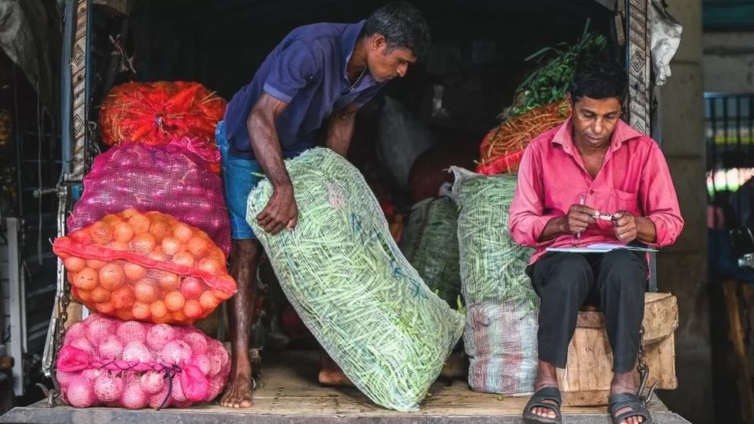Sri Lanka began a five-day bank holiday on Thursday to allow the crisis-hit nation to restructure $42bn (£33.2bn) in domestic debt.
The country is facing its worst economic crisis since it won independence from the British in 1948.
There are fears that the government's restructuring plan could lead to volatility in financial markets.
Debt restructuring can involve the extension of the period over which a loan is repaid.
"The government's action to call an extended public holiday means it obviously saw the risk of bank runs," Alex Holmes, a senior economist at Oxford Economics, told the BBC.
Local media also quoted analysts as saying that the holiday was announced to provide a suitable buffer for any potential market reactions to significant financial announcements.
Earlier this week, Sri Lanka President Ranil Wickremesinghe reassured the public that that the restructuring would "not lead to a collapse of the banking system".
On Wednesday, Mr Wickremesinghe's office said his cabinet had approved a restructuring proposal by the country's central bank. The plan will be submitted to parliament for approval over the weekend.
"(The) government expects the entire process to conclude while the markets are closed during these five days," Sri Lanka central bank chief Nandalal Weerasinghe said.
Mr Weerasinghe added that "local depositors are assured of the safety of their deposits and interests will not be affected".
The move to restructure domestic debt comes as the country is struggling to come out of its worst economic crisis.
Last year, Sri Lanka defaulted on its debt with international lenders for the first time in its post-independence history.
However, there have been several important lifelines extended to the country in recent months.
The World Bank has just granted it $700m, following a $3bn bailout package from the International Monetary Fund (IMF).
The World Bank said in a statement on Thursday that it would provide support in a "phased approach".
The organisation added that it has allocated $500m to budgetary support, while the remaining $200m would be used to "provide better-targeted income and livelihood opportunities to the poor and vulnerable".
The IMF's bailout in March, which was nearly a year in the making, was viewed as a massive lifeline for Sri Lanka.
However, the bailout came with conditions, such as requiring the country to make "swift progress" on restructuring its debts.
In March, the IMF said Sri Lanka had secured financing assurances from all its major creditors, including China and India, which paved the way for the bailout.
The IMF has so far released around $330m in funds to Sri Lanka, with the rest due in disbursements over four years.
The economic crisis
Sri Lanka's economy has been hit hard by the pandemic, rising energy prices, populist tax cuts and inflation of more than 50%.
A shortage of medicines, fuel and other essentials also helped to push the cost of living to record highs, triggering nationwide protests which overthrew the ruling government in 2022.
Sri Lanka's central bank outlined the extent of the country's economic crisis earlier this year.
According to its latest annual report, "several inherent weaknesses" and "policy lapses" helped to trigger the severe economic problems that engulfed the South Asian nation.
The central bank also forecast that the Sri Lankan economy would shrink by 2% this year, but expand by 3.3% in 2024.
Its prediction is more optimistic than that of the IMF, which forecasted economic growth of 1.5% in Sri Lanka next year.
Latest Stories
-
Samson’s Take: Arrogance of Power, Shameful Policing
6 hours -
Burnley score late to draw with Manchester United at Old Trafford
9 hours -
Bayer Leverkusen extend unbeaten run to 46 games after draw with Stuttgart
9 hours -
Chelsea come from two goals down to draw against Aston Villa
9 hours -
Andre Ayew scores in Le Havre’s 3-3 draw with PSG
9 hours -
GPL 2023/24: Kotoko draw with Medeama; Samartex go 7 points clear of Nations FC
9 hours -
Mahama cuts sod for construction of new multipurpose Jakpa palace in Damongo
9 hours -
NSS management assists Papao fire victims
10 hours -
EXPLAINER: Will dumsor end soon?
10 hours -
IMANI Africa takes on EC, accuses it of lying and publishing half truths
11 hours -
Manasseh Azure calls for investigation and prosecution of those responsible for GRA/SML contract
12 hours -
Kwesi Atuahene: Ghana’s health capital depends on HealthTech – Africa Center for Digital Transformation
12 hours -
13 signs your wife is planning on leaving you and you have no idea
12 hours -
IMANI Africa: Ghana’s EC’s dangerous and pathological conduct
12 hours -
If I speak there will be fire – Salah on Klopp row
13 hours

